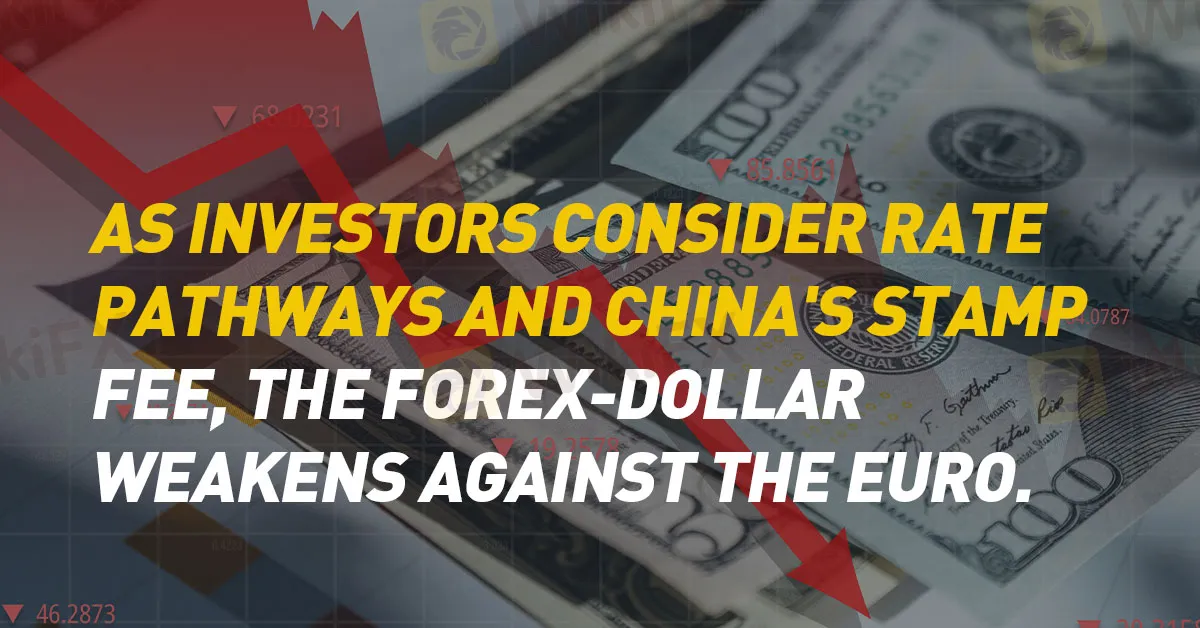简体中文
繁體中文
English
Pусский
日本語
ภาษาไทย
Tiếng Việt
Bahasa Indonesia
Español
हिन्दी
Filippiiniläinen
Français
Deutsch
Português
Türkçe
한국어
العربية
AS INVESTORS CONSIDER RATE PATHWAYS AND CHINA'S STAMP FEE
Abstract:After Federal Reserve Chair Jerome Powell hinted at the likelihood on Monday, the dollar fell off a 12-week high, while the China-sensitive euro crept higher as a result of Beijing lowering its stamp fee on stock trading.

After Federal Reserve Chair Jerome Powell hinted at the likelihood on Monday, the dollar fell off a 12-week high, while the China-sensitive euro crept higher as a result of Beijing lowering its stamp fee on stock trading.
The dollar index =USD, which compares the value of the dollar to those of six other currencies, dropped 0.06% to 104.11 on Saturday after reaching its highest level since early June on Friday. The index is poised to end a two-month losing trend with a gain of more than 2% in August.
In a much-anticipated speech at the annual Jackson Hole Economic Policy Symposium, Powell committed on concerns from the unexpected strength of the U.S. economy as well as progress achieved on lowering price pressures.
According to the CME FedWatch tool, markets see an 80% chance of the Fed maintaining its current policy next month, but a 25-basis point raise in November is now more likely than it was a week ago: 51% as opposed to 33%.
According to Chris Weston, head of research at Pepperstone, It's still doubtful that the Fed would raise interest rates in September. But November is looking to be a change expectation for interest rates.
The Fed possibly starting up again in November is helping the dollar, according to Weston, at a time when many other G10 central banks have already priced in an extended pause.
A string of positive U.S. economic data releases about a recession, but some investors are concerned that the Fed will maintain high interest rates for a longer period of time given that inflation is still above.
Investors will be paying close attention to statistics on payrolls, core inflation, and consumer spending this week because the Fed has stressed the forthcoming U.S. economic data.
Further tightening could be anticipated, according to Rodrigo Catril, senior currency strategist at National Australia Bank, if the data doesn't cooperate.
WORLD SUMMER
In other news, the euro, which has lost 1.7% of its value so far in August, increased by 0.14% to $1.0809 after China cut the stamp fee on stock trading in an effort to revive the faltering market in the second-largest economy in the world.
However, the euro was close to an almost 11-week low after European Central Bank President Christine Lagarde emphasized the necessity for restrictive policies.
There is now a tie in the market over whether the 3.75% rate will increase again in September.
As a result of the Chinese central bank consistently issuing stronger-than-expected daily midpoints, the value of the Chinese yuan against the dollar has stabilized. At 7.2932 per dollar, the spot yuan CNY=CFXS.
Australia's sensitive to China currency, the AUD=D3, increased by 0.1% to $0.6408 after falling earlier this month as concerns over China's sluggish post-pandemic recovery impacted on mood.
According to Tommy Wu, senior economist at Commerzbank, “market confidence will probably not increase much until there are signs of China's weakening economic momentum turning around.”
The yen JPY=EBS decreased by 0.02% to 146.48 per dollar, slightly above the nearly nine-month low of 146.64 reached on Friday. Traders are still on the lookout; the Japanese government may be intervening in the currency market.
As underlying inflation in Japan continues to be “a bit below” its objective, the Bank of Japan will retain its present ultra-easy policy, the central bank's governor said on Saturday.

Disclaimer:
The views in this article only represent the author's personal views, and do not constitute investment advice on this platform. This platform does not guarantee the accuracy, completeness and timeliness of the information in the article, and will not be liable for any loss caused by the use of or reliance on the information in the article.
Read more

Alleged Concerns with TradeEU.global's Trading Practices
An individual trader has come forward with allegations of an unfavourable experience while using the services of the broker TradeEU.global.

Lured by False Promises: Malaysian Driver Lost RM218K to an Investment Scam
A 49-year-old e-hailing driver in Malaysia fell victim to a fraudulent investment scheme, losing RM218,000 in a matter of weeks. The scheme, which falsely promised returns of 3 to 5 per cent within just three days, left the individual financially devastated.

Italian Regulator Warns Against 5 Websites
The Italian regulator, CONSOB has issued a warning against five websites offering unauthorized financial services. This regulatory action aims to protect the public from fraudulent activities.

Trader Exposes Unethical Practices by STP Trading
A recent allegation against STP Trading has cast doubt on the firm's business practices, highlighting the potential risks faced by retail traders in an increasingly crowded and competitive market.
WikiFX Broker
Latest News
Saxo & Portuguese Bank Partnership
SEC Fines Broker-Dealers $275K for Incomplete SAR Filings
WikiEXPO Global Expert Interview: Advanced Practices and Insights in Financial Regulation
Lured by False Promises: Malaysian Driver Lost RM218K to an Investment Scam
FTX Sets March 2025 Timeline for Creditor Payouts: What It Means for Investors
What is an Economic Calendar? How it works
Italian Regulator Warns Against 5 Websites
Mastercard's 2030 Vision: Biometric-Driven, Tokenized Payments
SFC Freezes $91M in Client Accounts Amid Fraud Probe
Bybit Launches Gold & FX Treasure Hunt with Real Gold Rewards
Currency Calculator


